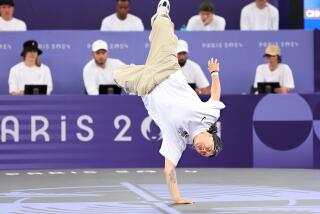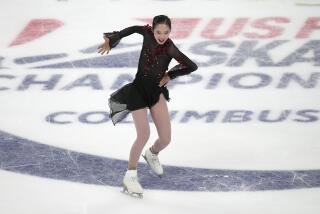Kim Yuna handles pressure, and rival Mao Asada, to lead after short program
- Share via
Reporting from Vancouver, Canada — After nearly a year of breathless anticipation, enough to make any women’s figure skater hyperventilate if she got caught up in it, the skating world finally got a chance to see whether it’s newest star, Kim Yuna of South Korea, could withstand the pressure and perform at the level that had made her a heavy Olympic favorite.
Her coach, Brian Orser, knew what Kim was going through, having entered the 1988 Olympics in Calgary as Canada’s primary hope for a gold medal and winding up with silver. He has been counseling the skater about dealing with it since she won the 2009 world title.
“We don’t guard them against the pressure at all,” Orser said. “You have to face it head on. You certainly don’t say this is not just another competition, because you know that it isn’t.”
And Kim handled it as brilliantly as she skated in Tuesday night’s short program, even when more pressure was added with an in-your-face skate by Japan’s Mao Asada.
“My confidence is very good at these Olympics,” Kim said.
As Kim took the ice with the crowd roaring for Asada’s stunning performance to music of “Khatchaturian,” including a rock solid triple axel-double toe loop combination, she went her Japanese rival one better.
When Kim finished, the two 19-year-olds had just skated the two greatest short programs in Olympic history.
Kim, who countered with a triple lutz-triple toe combination in her sassy program to a James Bond medley, rolled up a world record 78.50 points, breaking the mark of 76.28 she set earlier this year.
Asada, who had struggled all season, had 73.78, nearly 15 points better than her previous season best.
About a half-hour later, Canada’s Joannie Rochette created a moment that few who witnessed it will ever forget.
Competing less than three days after her mother, Therese, 55, died of a heart attack early Sunday in Vancouver, Rochette skated as well as she ever has.
“I just applaud her for taking the ice,” said U.S. skater Mirai Nagasu, 16, who finished sixth. “This is what the two of them worked so hard for. I think she will do her best because her mom will be with her.”
Skating to music of a famous tango, Rochette managed to stay in character and hold her composure until completing a program that put her third with 71.36 points. Then she bit her lip and began to cry.
As she waited for her scores, which would give her a 6.60-point cushion over fourth-place Miki Ando of Japan, Rochette, a native French speaker, mouthed what appeared to be the word, “Maman.”
Rochette’s father, Normand, was seen sheeding tears through the entire program, beginning with the moment she took the ice.
“It’s hard to handle ÃÂ words can’t describe it. ÃÂ I’ll remember this forever,” Rochette said in a statement read by William Thompson, chief executive of Skate Canada.
Despite a shaky landing on her triple lutz jump, U.S. champion Rachael Flatt delivered her expected solid performance -- with a triple-triple combination. Flatt also got higher scores than expected and stood fifth, only .12 behind Ando.
“Aside from the landing, it was a great program for me,” Flatt said.
Kim had a 4.72-point margin over Asada, gaining 3.2 on the technical elements and 1.52 on components.
“Usually, there is about a 10-point difference between myself and Kim Yuna,” Asada said. “So I feel great that it was a little closer.”
The long program final is Thursday.
Asada’s successful triple axel was only the second by a woman in Olympic skating history and the first in combination. Her countrywoman, Midori Ito, landed one while finishing second at the 1992 Olympics.
“I am very relieved,” said Asada, who had made a big error on the triple axel in all three of her previous international competitions this season.
Kim said she was fully conscious of how well Asada had skated, because she heard both the audience response and Asada’s score.
“I wished I wasn’t aware, but it is very difficult not to be,” Kim said. “I do have a lot of experience, so I don’t think (Asada’s) performance affected my performance a lot.”
Kim had gained more confidence to resist pressure from her strong practices at her Toronto training base right before the Olympics. She thinks that will continue as the tension mounts before the long program, where one big mistake could cost her enough points to lose.
“I put a lot of importance on the short program and not only on the long program,” Kim said. “I don’t think it will be any different Thursday. I hope I will not be nervous, but, of course, I may be a little bit.
“If I do practice a lot, I will be more confident, and I trust that I will be able to do a good performance, and it will give me a gold medal.”
The women have two full practices Wednesday and a warmup Thursday.
Kim’s combination, one of the eight required elements in the short program, earned a better grade of execution than Asada’s and was worth 12 points. Asada’s was worth 10.10.
Asada intends to do a second triple axel in the free skate.
Nagasu of Arcadia, Calif., first of the high-rated competitors to take the ice in the short program, was planning to gamble on a tougher jump combination than she had done this season.
Nagasu, in her first Olympics, was in a perfect position to take the gamble, with no pressure on her.
But Nagasu decided to do triple-double after over-rotating the triple lutz. She wound up with a season-best score of 63.76, but was disappointed.
“In the Olympics, a medal is a big goal,” she said. “From today’s performance, I don’t think I can reach the podium.”
Nagasu said she opted out of the triple-triple after a ‘“funky landing” on the opening lutz.
About a minute later, she suddenly had a bloody nose.
“You have to deal with what you’ve got, even if you’ve got blood running down your nose,” she said. “I still did the best I could, and I think it was OK.”
Nagasu had positive grades of execution on every element except the original combination, where she lost 1.2 points for a wrong edge takeoff. Her component scores were relatively low, all in the six-point range, which is the way judges often penalize skaters whom they think have more dues to pay.
“I thought I could have skated better,” she said. “I’m happy that in my first Olympics, I didn’t fall yet.”
More to Read
Go beyond the scoreboard
Get the latest on L.A.'s teams in the daily Sports Report newsletter.
You may occasionally receive promotional content from the Los Angeles Times.






